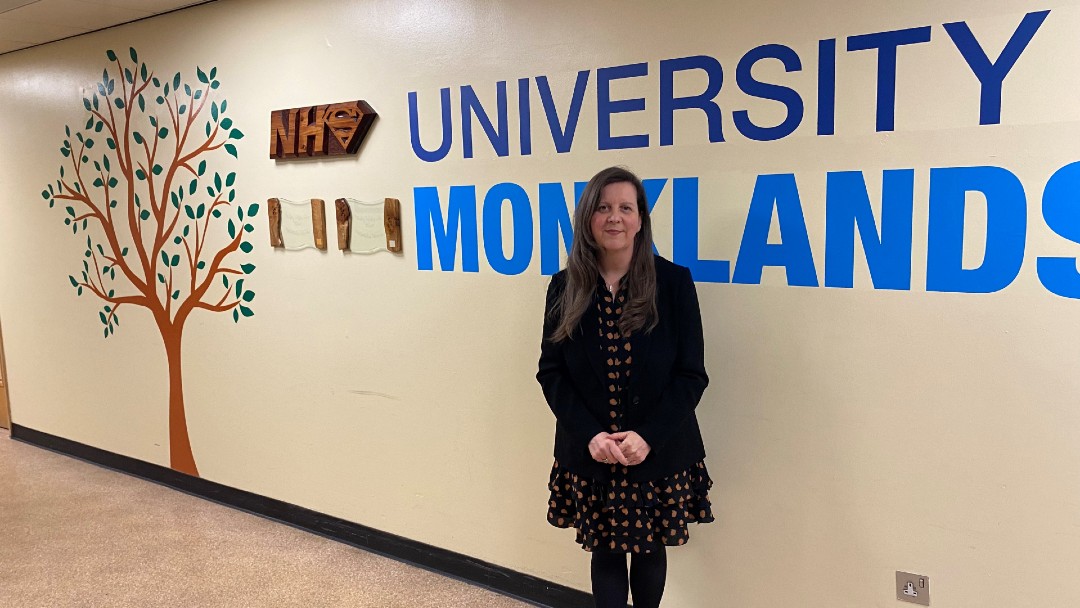NHS Lanarkshire has launched Operation FLOW – a positive and ambitious plan to reduce service pressures and improve patient care and experience.
Plans are developing rapidly across the whole health and care system in Lanarkshire to reset our system to improve flow through our acute hospitals.
We are asking every member of staff to consider “How can I help make a difference?” Working together we can make this project a real success.
Flow refers to the way patients move through a hospital, from admission to discharge. Improving hospital flow can lead to better patient outcomes, increased capacity, improved staff satisfaction and improved patient safety. It can also help reduce wait times and improve overall patient satisfaction.
Operation FLOW (Focused, Lanarkshire, Optimal, Whole system) is divided into three stages:
Stage 1 – Preparation and reset, which is currently underway;
Stage 2 – Firebreak, which will take place from 23 February to 3 March; and
Stage 3 – Maintaining good flow, which will involve the implementation of a new flow model.
Professor Jann Gardner, chief executive of NHS Lanarkshire, said: “Thank you to all our staff and GPs for their continued efforts to improve our services and provide the best care we can. We have a fantastic team in NHS Lanarkshire and everyone’s support is crucial to making this a success. I’m delighted by the energy and enthusiasm everyone is already bringing to this important opportunity.”
A vital part of Operation FLOW is the co-ordinated effort currently underway across our services to prepare for the short-term firebreak. This is a powerful package of actions to quickly ease the current pressures across our three acute hospitals over a nine-day period.
We are now in week -3 in the countdown toward the start of the Operation FLOW firebreak. The focus of our work is to reset our system, improving patient flow using all tools available. This includes active flow out of the emergency departments; clear management plans; setting early planned date of discharge (PDD) and every ward ensuring discharges are actioned as early as possible. We are working on all of this ahead of our full firebreak.
The firebreak’s goal is to stabilise our system – benefiting patient care and releasing the time and energy we need to make sustainable improvements for patients and staff. This includes a reduction in hospital occupancy levels which in turn will enable us to focus on providing the right care, in the right place at the right time.
During the nine-day firebreak, from Thursday 23 February to Friday 3 March, all of our health and care system will work together in a co-ordinated manner to focus on a system reset. The firebreak has seven key action areas which were agreed by senior leaders from across NHS Lanarkshire, South and North Lanarkshire health and social care partners and the Scottish Ambulance Service (SAS).
The firebreak key actions are:
1. Commission mobile multi-disciplinary teams (MDTs) to undertake a daily review of all patients for the nine-day firebreak to ensure that all patients meet the criteria to reside in an acute bed;
2. Commission a mobile MDT to undertake a daily review for the nine-day firebreak to ensure that each patient meets the criteria to reside in an off-site bed;
3. Expediting clinically stable inpatients waiting for diagnostics to discharge;
4. Provide professional-to-professional clinical decision-making support for care home residents prior to conveying residents to hospital;
5. Reduce the number of access routes to hospital-based urgent and emergency care during the period of the firebreak;
6. Expand access to ambulatory care for the duration of the firebreak;
7. Increase senior clinical decision-maker resource in Hospital @ Home to support more people in the community for the duration of the firebreak period.
Professor Gardner said: “Operation FLOW is a hugely exciting opportunity to make the improvements our patients and staff need in the face of the challenges experienced not just in Lanarkshire, but in health and care services across the country.
“Crucially, Operation FLOW is based on tried and tested approaches. It’s about taking the approaches that we know will work and make a difference and putting them together in a co-ordinated and focused way that brings the maximum benefit to our patients and staff.
“While the firebreak is really important to what we are doing and will bring immediate benefits, its greatest value is that it will free up the capacity and energy needed to bring about sustainable improvements to our services – improvements that will make our whole health and care system more robust and resilient in the face of future periods of pressure.”
Operation FLOW is a whole-system approach that involves NHS Lanarkshire, South Lanarkshire Health and Social Care Partnership, Health and Social Care North Lanarkshire and the Scottish Ambulance Service working together closely.
Professor Gardner said: “By working together, we want to be able to get patients coming through our emergency departments seen, treated and either admitted or discharged as quickly as possible. At the same time, we need to be able to discharge patients, who are clinically fit, to their own home or another appropriate care setting.
“If we can pull together as a team, with every member of staff taking the time to understand the plans and be clear on each of us can make a difference, then we can achieve a very real change. Getting to that point will make a massive difference to our patients and staff experience every day.”
You can also find out more on our website at: www.nhslanarkshire.scot.nhs.uk/OperationFLOW
If you have ideas, comments or questions for the project team, email operationFLOW@lanarkshire.scot.nhs.uk
- Professor Jann Gardner, chief executive
Vimeo – https://vimeo.com/793379045
YouTube – https://youtu.be/wuTXS3FARTU
- Calvin Brown, director of communications
Vimeo: https://vimeo.com/793404875
YouTube: https://youtu.be/etOtUW_6Op4
- Kirsty Orr, head of planning and development
Vimeo: https://vimeo.com/793407936
YouTube: https://youtu.be/3KxyvEnovWU



